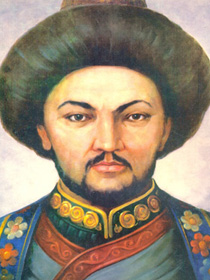
Many Kazakh batyrs, after learning about the initiative of Abulkhair Khan, were very unhappy with it. The lives of not only the Russian ambassador who accepted Islam, A.I. Tevkelev, but also of Abulkhair himself, an influential leader who commanded all the Kazakh forces in the Anrakay battle, were under threat.
There were several reasons for making such a serious decision as entering into Russian citizenship. The most important is called the Dzhungar oppression, which, despite the rebuff in 1718, continued and intensified. Threats were also from the Bashkir rulers - even when the Dzungarian Khanate was occupied by the confrontation of the Qing Empire, the Bashkir forces pressed on the Kazakh population.
Abulkhair Khan hoped to join the Russian Empire to establish relations with the Bashkirs who had Russian citizenship. The Bashkir party was also interested in joining the Kazakh Khanate to Russia, so the Russian embassy was accompanied by Bashkir representatives Taimas Shaimov and Aldar Issekeyev.

No less important factor was Abulkhair Khan's personal ambitions who sought to strengthen his power. Despite his considerable military achievements, the brother of Bolat-khan, Shahmukhamed (Sameke), and the son of Bolat-khan, Abulmambet, claimed the khan's place. Historians suggest that the choice of not the absolute majority fell precisely on Abulmbambet, which, of course, did not suit the Khan of the Younger Zhuz.
But, there are facts that refute this arrangement of political forces in the Kazakh Khanate. I. Erofeyeva argues that the son of Tauke Bolat died around 1724 and was never the senior khan. In 1730 the senior khan was Abulkhair. Abulmambet was proclaimed Khan of the Middle Zhuz long after that time.
Nevertheless, Abulkhair Khan needed the support of the Russian Empire. In 1730, his ambassadors Seitkul Koidagulov and Kutlumbet Koshtayev handed over an official message saying:
"We ... wish you protection and expect your help to live in harmony with the Bashkir people beyond the Urals".
This was a deliberate lie on the part of Abulkhair Khan, since on his side there were only a few batyrs of small families.
February 19, 1731 Anne of Russia signed a charter on the voluntary acceptance of Kazakhs in citizenship. For the swearing in of new subjects on April 30, an embassy was sent to Abulkhair under the leadership of A.I. Tevkelev. As already mentioned he accepted Islam, knew many Eastern languages and in Russia was a major specialist in relations with the Asian peoples.
Upon the arrival of Tevkelev to the Khan, unexpected and very unpleasant news awaited him. Abulkhair Khan revealed to him that he, Khan, had asked for the patronage of the All-Russian without the consent of the other khans and sultans, and the Kyrgyz foremen.
In this case, the life of Tevkelev was exposed to real danger.
A great role in the successful completion of the mission and the preservation of the life of the Russian ambassador and Abulkhair Khan belonged to the notorious Kazakh batyrs, who had great influence and support of large clans. They repulsed several attempts on the life of Tevkelev, and also prevented conspiracies directed against this plan.
One of the turning points occurred on October 10 at the Qurultay, which was rather a trial of Khan Abulkhair and Tevkelev. The elders immediately angrily attacked the envoy with questions about what goals he had come. Tevkelev told them about his mission. This became the basis for the accusation of Abulkhair Khan who violated the steppe laws.
Unexpectedly for all, Abulkhair Khan did not justify himself and stated bluntly that he asked for citizenship exclusively in his own interests, since he prefers to perish, rather than remain in the position of a formal monarch, whose status is similar to the situation of domestic cattle whose life is entirely in the hands of its master.
After that, the indignant biys pronounced the death sentence and Tevkelev, who, in their opinion, performed the role of not an envoy, but a spy aimed at the subsequent war of Russia against the Kazakhs.
Tevkelev adequately kept himself, saying that his country does not need such subjects, while Kazakhs on the contrary are vitally interested in its protection. At the end of his speech, he suggested to the elders, in case of a final refusal to accept Russian citizenship, to immediately release him to his homeland.
Of course, these words could not somehow affect the biys, who were already firmly determined in their decision. But unexpectedly the course of negotiations was changed by Batyr Bokenbay. He stated that on behalf of his family he wanted to take the oath of allegiance to the Russian Empire, and suggested that Abulkhair be the first to pass this ceremony. Khan immediately swore an oath on the Koran, after him Bokenbay, Esset, Kudainazar and 27 more elders, whom the batyrs managed to win over to their side, took the oath. Thus, the court was ripped off. The quarrel with the influential batyrs was fraught with dangerous consequences, so Bokenbay's performance did not develop into a massacre.
Translated by Raushan MAKHMETZHANOVA
